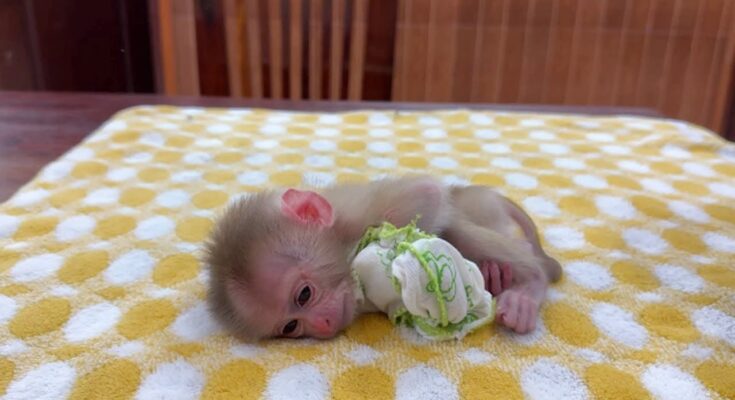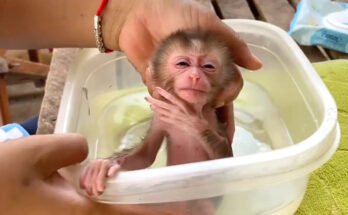Welcome Your Baby Monkey with Love! 🐒❤️ Discover essential care tips for nurturing your newborn primate. From nutrition and bonding to creating a safe environment, learn how to ensure your little monkey thrives. Explore expert advice and fun facts about their unique needs. Start your adventure in primate parenting now!
Have You Ever Seen a Newborn Baby Monkey Taking a Shower? A Delightful Sight!
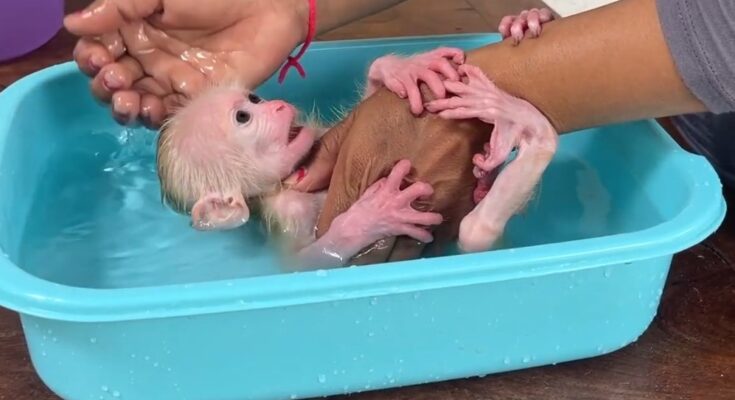
The world of baby animals is full of surprises, and watching a newborn monkey take a shower is one of the most adorable sights you’ll ever witness. These tiny creatures, just starting to explore their surroundings, often interact with water in ways that will melt your heart. Let’s dive into the fascinating experience of baby monkeys and their first showers.
A Rare and Adorable Moment
Newborn monkeys are naturally curious, but they rely heavily on their mothers to guide them in the early stages of life. When it comes to water, the experience is often new and intriguing for these little ones. Unlike adult monkeys, who may be accustomed to grooming rituals, a baby monkey’s first interaction with water is usually clumsy yet heartwarming.
Mothers play a vital role during this time, gently introducing their babies to water. Whether it’s a quick rinse or a playful splash, these moments not only clean the baby but also strengthen the bond between mother and child.
Why Do Baby Monkeys Take Showers?
Monkeys in the wild and captivity alike have a natural inclination for cleanliness. Showers or baths help remove dirt, parasites, and debris, keeping their skin and fur healthy. For newborns, it’s also a way to stay cool in warm climates and maintain comfort.
In many cases, baby monkeys don’t just passively experience showers—they actively enjoy them! Their tiny hands may play with the water, and their curious eyes follow the ripples and splashes. These interactions provide sensory stimulation and contribute to their learning and development.
Monkeys and Water: A Unique Relationship
Not all monkeys are naturally drawn to water, but species like macaques and capuchins are known for their playful behavior around rivers and streams. Seeing a newborn monkey take a shower reminds us of their adaptability and the similarities they share with humans.
Conclusion
Watching a newborn baby monkey take a shower is a magical moment that showcases the wonder of nature. These tiny creatures, full of life and curiosity, remind us of the simple joys that come with discovery. If you ever have the chance to witness this adorable sight, cherish it—it’s a rare and unforgettable experience!
How Baby Monkeys Are Born and Fed: A Fascinating Journey Into Nature
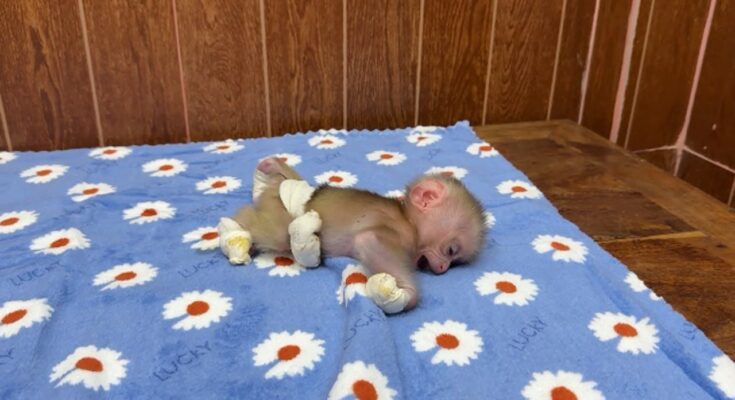
The miracle of life in the animal kingdom never ceases to amaze us. Among the most captivating stories is that of baby monkeys—how they are born and nurtured by their mothers. In this article, we’ll explore the birth process of monkeys, how they are cared for, and the unique way they are fed during their early days.
How Baby Monkeys Are Born
Monkeys, like humans, are mammals and give birth to live young. The gestation period varies depending on the species, but it typically lasts between 4 and 7 months. When a baby monkey is born, it is usually tiny, fragile, and fully dependent on its mother.
The mother monkey ensures a safe environment during birth, often isolating herself or staying within the protection of the group. Once the baby is born, the mother immediately begins cleaning it, using her hands and mouth to remove any birth fluids and ensure the newborn starts breathing properly.
The First Few Days: A Time of Bonding
The bond between a mother monkey and her baby is extraordinary. Baby monkeys cling tightly to their mothers, relying on them for warmth, protection, and transportation. During these critical early days, the mother rarely separates from her baby, ensuring its safety in the wild.
How Baby Monkeys Are Fed
Like all mammals, baby monkeys are nourished by their mother’s milk. This milk is rich in nutrients and antibodies that are essential for the baby’s growth and immunity. A baby monkey will nurse frequently, often several times an hour, during the first few weeks of life.
As the baby grows, the mother may introduce it to solid food by sharing bits of fruit, leaves, or insects. This gradual transition helps the baby monkey learn what to eat and how to forage for food.
Conclusion
The journey of a baby monkey from birth to independence is a fascinating process filled with care, bonding, and learning. It’s a beautiful reminder of the nurturing instincts present in the animal kingdom. Next time you see a monkey with her baby, take a moment to appreciate the love and effort involved in raising these incredible creatures.
Mom Put Newborn Baby Monkey On Steam F-r-i-ed For Traditional Treatment
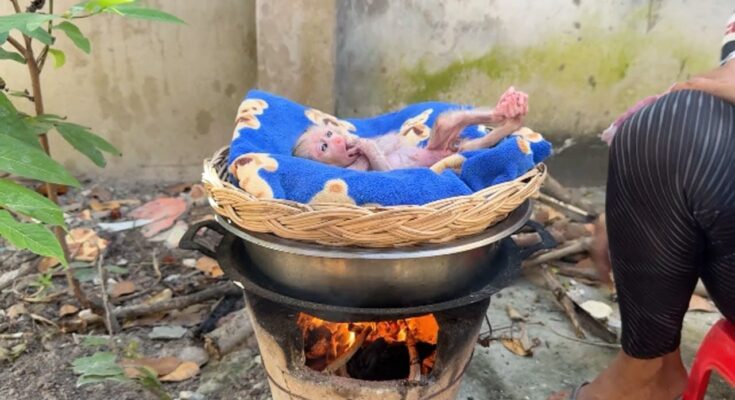
Discover Fascinating Facts About Baby Monkeys 🐒 – A Heartwarming Journey!”
Looking to learn what makes baby monkeys so adorable and intriguing? From their playful antics to their unique bond with their families, explore the most captivating details about these little primates. Start your adventure now, and don’t forget to check out the exciting offers brought to you
Baby monkeys are incredibly fascinating creatures with a mix of intelligence, curiosity, and playfulness that captures the hearts of many. Here are some interesting facts about baby monkeys:
Step-by-Step Guide to Feeding a Baby Monkey 🍼🐒
- Understand Their Diet
Baby monkeys require a diet similar to what they’d consume in the wild. Start with specialized milk formulas for primates or fruits like bananas and papayas. - Sanitize Feeding Tools
Always use clean bottles, syringes, or bowls to prevent infections. Hygiene is crucial for their health. - Feed Small Portions
Begin with small amounts to avoid overfeeding. Monitor how much they eat to adjust as they grow. - Maintain a Feeding Schedule
Feed baby monkeys every 2–3 hours for newborns, gradually spacing it out as they age. - Observe Behavior
Watch for signs of hunger or discomfort. If they seem distressed, consult a vet experienced with exotic animals. - Provide Fresh Water
Ensure they have access to clean water at all times for hydration. - Introduce Solid Foods Gradually
Around 6–8 weeks, begin introducing soft fruits and vegetables alongside milk. - Create a Bond While Feeding
Feeding time is a great opportunity to build trust. Be gentle and patient. - Consult a Vet Regularly
Regular health checks ensure the baby monkey is growing strong and healthy.
